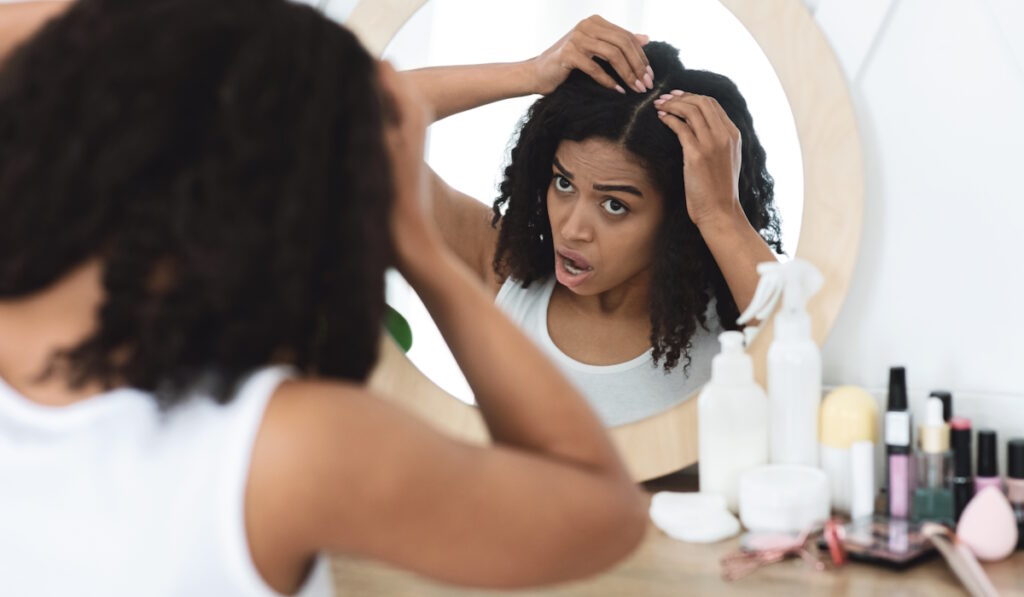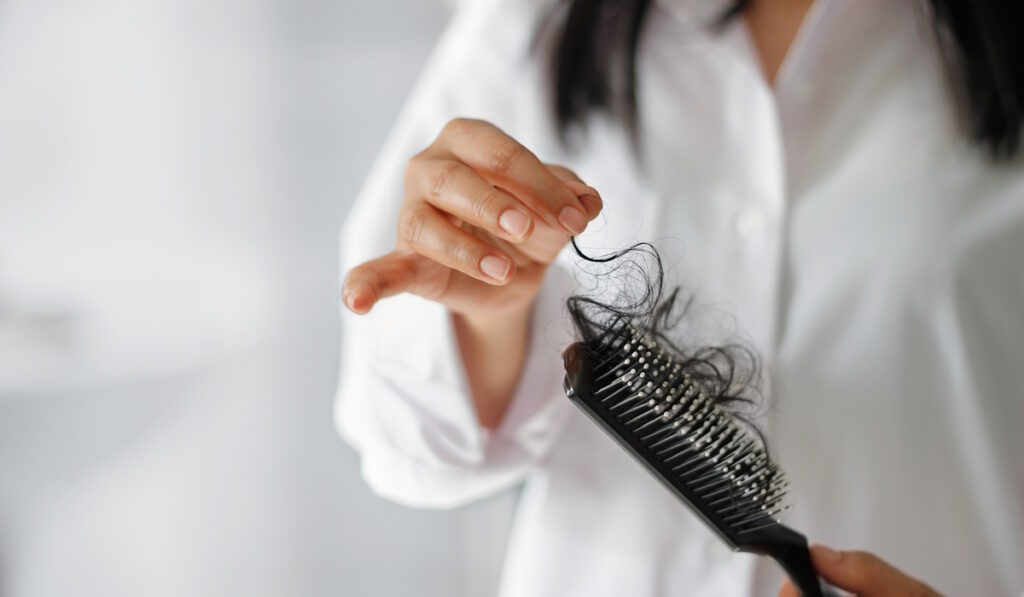Not all women experience noticeable hair loss. That said, the number of those who do is higher than you might think, with more than 50% of women experiencing hair loss in their lifetime. It’s easy to initially blame this excess shedding on common culprits such as stress, age, genetics, certain medications you may be taking, and even hormonal changes like menopause. But a growing amount of research suggests a link between uterine fibroid symptoms and hair loss, particularly among Black women—the most at-risk race for fibroids. Since August is National Hair Loss Awareness Month, our team at Fibroid Institute Texas wants to dispel any myths and shine light on truths regarding this connection.
It is important to note that uterine fibroids do not directly cause hair loss. There are many symptoms to watch out for with fibroids, including prolonged periods and heavy bleeding. But hair loss is not one of them. That said, there are several known correlations between fibroids and hair loss in Black women, particularly those with a form of permanent hair loss called Central Centrifugal Cicatricial Alopecia (CCCA). The scarring associated with CCCA is similar to the scarring associated with excess fibrous tissue elsewhere in the body, which could explain why women with this type of hair loss are at risk for fibroids.
Facts About Fibroids and Black Women

To understand the connection between fibroids and hair loss, we first must discuss the connection between fibroids and Black women. Fibroids are noncancerous tumors in the female reproductive system and are extremely common. You may have one or several, all of which can differ in size, and the symptoms can range from heavy and irregular periods to painful sexual intercourse, back pain, constipation, and pelvic pain and pressure. Though any woman can develop fibroids, they have a greater impact on Black women in comparison to other races. In fact, the rate of hospitalization for fibroids is three times higher for Black women than white women. They are also two to three times more likely to undergo a hysterectomy and seven times more likely to have a myomectomy.
Here are a few more interesting facts about fibroids and Black women:
- Black women are diagnosed at a younger age (between 29 and 39)
- More often, the patient has larger and multiple fibroids
- Their fibroids display faster growth
- Their fibroids shrink slower after pregnancy (fibroids in white women shrink faster)
- More severe symptoms (heavy bleeding, prolonged periods, cramping, etc.)
- Surgery at earlier age (many times during childbearing years)
- More complications during surgery
All women are at risk for fibroids because of a variety of factors, including family history, hormonal imbalances, vitamin D deficiency, excess body weight, and a diet higher in red meat and sugary foods. And as previously stated, it appears there is a correlation between fibroids and hair loss among Black women that we can add to the list.
Do Fibroids Cause Hair Loss?
In short, no. However, there are a few known links that are worth discussing during National Hair Loss Awareness Month. For example, two of the more common symptoms of fibroids are abnormally long periods and heavy bleeding. For many, this can lead to a significant amount of blood loss and additional complications from anemia. This is a condition marked by a dangerous shortage of red blood cells or dysfunctional red blood cells in the body that affects approximately 1.62 billion people globally. Some fibroids cause more bleeding than others, which can lead to symptoms such as fatigue, increased heart rate, iron deficiencies, and even hair loss.
Iron deficiencies have been known to restrict blood flow necessary to supply nutrients to hair follicles. As a result, you may experience hair loss. The good news is that iron deficiencies and anemia can be treated, thus making it possible to regrow hair. But researchers are also discovering a more permanent connection between fibroids and hair loss that has many Black women clamoring for answers and a much-discussed topic on fibroid forums.
What Is Alopecia and CCCA?

Several studies suggest there is evidence that Black women with Central Centrifugal Cicatricial Alopecia (CCCA) have an increased chance of developing uterine fibroids. CCCA is a form of permanent hair loss that begins in the center of the scalp as a small, balding, and round patch that grows over time. It is the most common form of permanent alopecia among Black women. While some women say they never feel any discomfort, the American Academy of Dermatology Association says others may develop such symptoms as:
- Intense itchiness
- Burning and stinging pain
- Pain in the scalp
- A scalp that feels scaly, bumpy, or crusty
- A scalp with a shiny, smooth appearance due to scar tissue growing over destroyed hair follicles.
According to Johns Hopkins in a study published by JAMA Dermatology, there is a five-fold increased risk of uterine fibroids in women with CCCA, compared to age, sex, and race matched controls. The study states that during a four-year period from 2013-2017, the researchers analyzed patient data from the Johns Hopkins electronic medical record system of 487,104 black women ages 18 and over. The prevalence of those with fibroids was compared in patients with and without CCCA. Overall, the researchers found that 13.9 percent of women with CCCA also had a history of uterine fibroids compared to only 3.3 percent of black women without the condition. In absolute numbers, out of the 486,000 women who were reviewed, 16,212 had fibroids
Within that population, 447 had CCCA, of which 62 had fibroids.
The researchers were quick to point out that the cause of the link between fibroids and hair loss is still unclear but that “the scarring associated with CCCA is similar to the scarring associated with excess fibrous tissue elsewhere in the body.” As a result, there was a strong enough association that women with CCCA should also be screened for fibroids. This was particularly true if they had symptoms such as heavy bleeding and pain.
Recognize Fibroid Symptoms and Seek Help

If you are a Black woman who is suffering from unexplained hair loss, it is important to get screened for fibroids. Even if immediate fibroid removal isn’t necessary, knowing the correlation between fibroids and hair loss and constantly communicating with your doctor and dermatologist can help avoid larger problems. CCCA is more likely to be permanent, but when diagnosed and treated early, much of the hair can be protected and/or restored.
That said, many women still also need a solution to their painful fibroid symptoms. Uterine Fibroid Embolization (UFE) is a unique procedure because of its ability to treat uterine fibroid symptoms—regardless of where fibroids in the uterus are located—without having to go through painful fibroid surgery and lengthy recovery time. Rather than remove fibroids, UFE uses interventional radiology and tiny particles to non-invasively cut off their blood supply and cause them to shrink.
Additional advantages of UFE at Fibroid Institute include:
- No hospital stay and shorter recovery period (one week in some cases)
- No scarring, no incision
- Over 90% effective in reducing fibroid symptoms
- UFE is covered by most major medical insurance
- Uterus remains preserved
- Tiny wrist puncture, no need for vaginal access
- All fibroids may be treated at the same time
- No side effects of hormone therapies typically used to treat fibroids
- Highly experienced fibroid specialists
- Patients have a doctor’s mobile phone number 24/7
- Unique pain management protocol, fostering an easy recovery
Our Fibroid Experts and UFE Specialists Want to Help
Hair loss of any kind—whether temporary or permanent—is something no woman wants to experience. If this is the case for you, it’s important to exhaust all resources in determining quickly why you are shedding so much hair. Believe it or not, you may be surprised to learn that there is a link between fibroids and hair loss in Black women. At Fibroid Institute, we are dedicated to educating and empowering women on issues related to uterine fibroid symptoms and treatment options.
With multiple locations, our Houston and Dallas fibroid centers help thousands of women avoid fibroid surgery but find relief from their fibroid symptoms. Our fibroid doctors are board-certified interventional radiologists and experts who are passionate about helping women.
With each UFE procedure, patients quickly realize they don’t have to be limited by fibroid symptoms or lengthy recovery times. For many women with fibroids, the UFE procedure changed their lives. Meet some of these women here:
We are dedicated to helping you become #FibroidFree. Get started now with Fibroid Institute Dallas at 214-838-6440 or with Fibroid Institute Houston at 713-903-3733 or complete the form below.
"*" indicates required fields
Prior to starting any new treatment or if you have questions regarding a medical condition, always seek the advice of your doctor or other qualified health provider. This information is not a substitute for professional medical advice.
Fibroid Institute Texas serves the Dallas and Houston areas including Addison, Carrollton, Plano, Frisco, Craig Ranch, McKinney, Allen, Fort Worth, Grand Prairie, HEB, Arlington, Hutchins, Irving, Duncanville, DeSoto, Cedar Hill, Lancaster, Cockrell Hill, Highland Park, University Park, Park Cities, Garland, Mesquite, Richardson, Dallas, Sherman, Houston, Sugar Land, Katy, Webster, Clear Lake, The Woodlands, Universal City, Spring, Kingwood, Stafford, Conroe, Texas City, Cypress, League City, Bellaire, and more.
*Patient names and/or photos may be changed to protect confidentiality.

